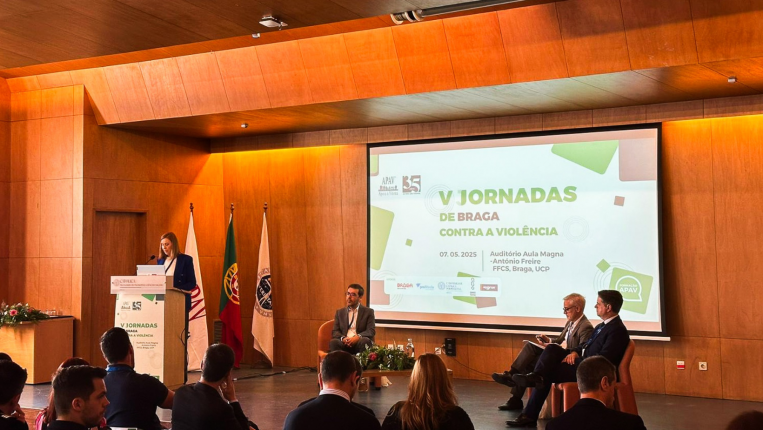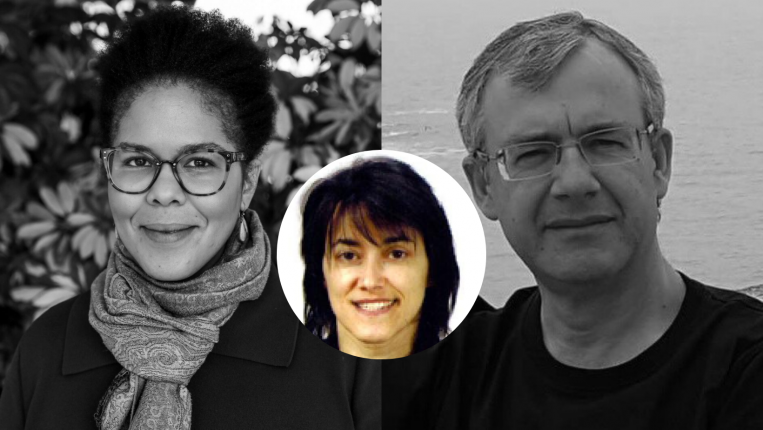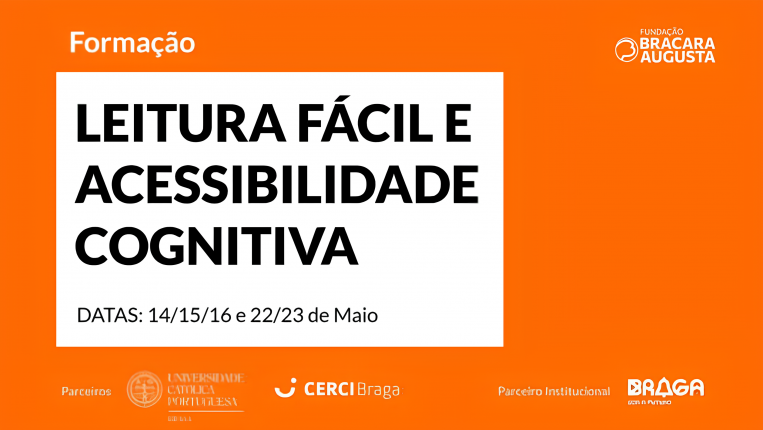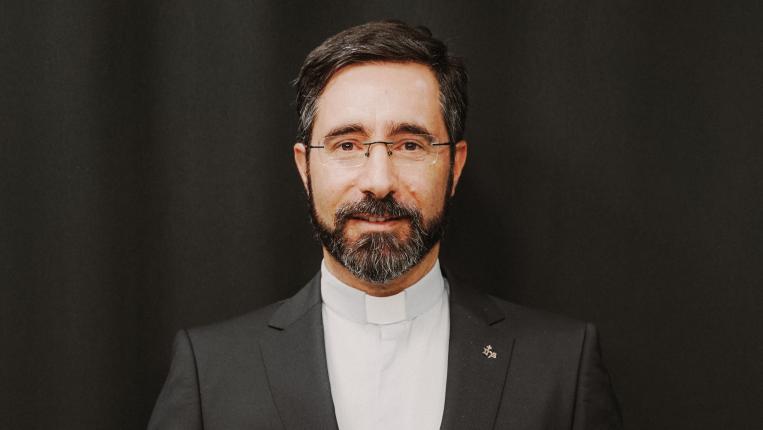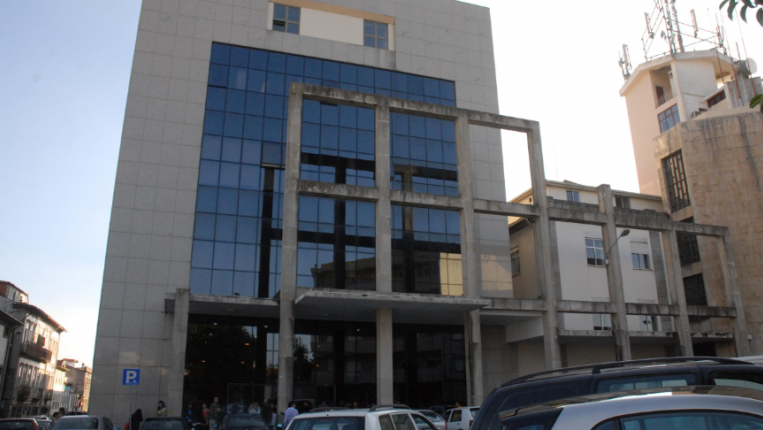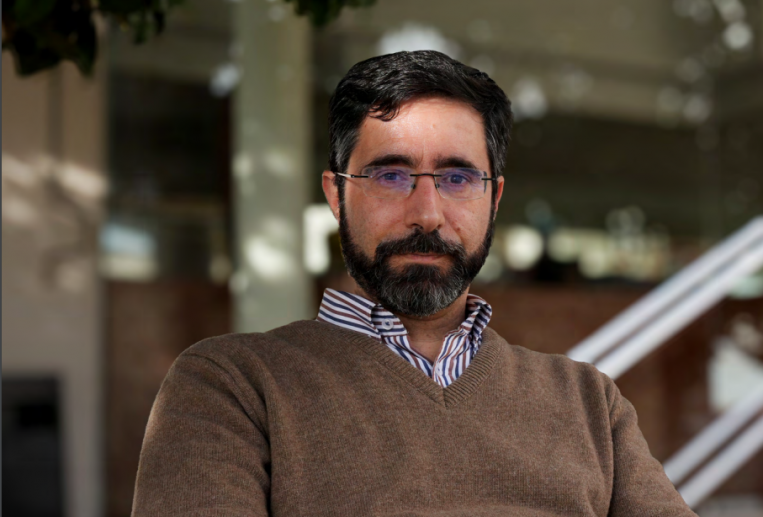
Born in Guarda, Jesuit Bruno Nobre has led the Faculty of Philosophy and Social Sciences (FFCS) at the Portuguese Catholic University - Braga Regional Center since September of last year, in close connection with the Society of Jesus, a Catholic religious order founded by Saint Ignatius of Loyola in the 16th century.
A man with a degree in Engineering Technology Physics and a PhD in Particle Physics from the Instituto Superior Técnico. He then went on to study philosophy and theology, with two master's degrees from Boston College (USA). On this academic path, he went on to do a post-doctorate in Philosophy of Science at the State University of Rio de Janeiro (Brazil). He is also a member of the Religion and Science Cluster of the Higher Education for Social Transformation project of Jesuit higher education institutions in Europe. A wanderer whose main mission is to enhance humanity.
Who is this man in front of me?
You have a Jesuit man in front of you. In my identity, this is perhaps the most important trait because it is the deepest. I'm a priest, a member of the Society of Jesus, dedicated to philosophy, although my basic training was in physics, where I even did a doctorate. Later, I studied philosophy and theology and ended up at the faculty as a teacher, where I am now principal. I'm at the faculty as a Jesuit carrying out a mission entrusted to me by the Society of Jesus. I'm from Guarda, a Beira. I lived there until I was 18. My family is all from a small parish in the municipality of Almeida. This also affects the way I see the world and relate to people.
What does it mean to be a Jesuit?
A Jesuit is a member of a religious order of the Catholic Church called the Society of Jesus. It was founded in the 16th century by St. Ignatius of Loyola. It is a religious congregation that has had a major impact on world history and more specifically on the history of our country. Jesuits are religious, which means that we take vows of poverty, chastity and obedience. We live in community. We are characterized by a willingness to serve the Church and the world wherever we are most needed. This trait of availability is very characteristic of a Jesuit. We have a very strong historical connection to education, since in the context in which the Society was born there was a great need for formation. The Pope, the Bishops and the Kings of the time asked the Society to make a contribution to education. In fact, the Jesuits are responsible for a large number of colleges and universities (around 200). They are also known for their missions. They have always given great importance to inculturation. All the work of evangelization has been based on a very positive dialogue with cultures. It's not surprising that there are Jesuits interested in local cultures, the sciences, the arts...
Nevertheless, this immaculate account of the Society of Jesus clashes with some troubled episodes that mark its history.
This is true. We only have to remember the expulsion of the Jesuits from Portugal in 1759, during the time of the Marquis of Pombal, and the subsequent extinction of the Society by the Pope in 1773. It was only restored in 1814. There are currently 125 Jesuits in Portugal and 14,000 in the world. At the moment, the Society, which has always been very international, is growing in Africa and Asia. That's where its “lung” is at the moment.
Do you feel, by instinct, that you're facing a Jesuit priest?
I would say that, in general, you can feel the difference. However, I want to make this clear: Jesuits are no better or worse than other priests or religious. We try to live our charism. I admit that you can feel the difference in a homily. We are very open to dialoguing with different cultures. We are cosmopolitan, we have always been associated with cities. Our formation has a very international dimension. Any Jesuit goes through two or three countries in their formation. I would say that a Jesuit, from the outset, should be very attentive to what is happening in the world, always with a positive outlook. In general, that's who we are.
When did you identify the call to be a Jesuit?
As a teenager I never thought I'd be a priest. I recognize that from an early age I had a great religious sensitivity. I liked to pray. I liked going to Mass. Even the more ritual dimension of the celebration of faith interested me. Until very late in life, I never thought about becoming a priest. I went through a phase, around high school and university, when I was even distanced from the Church. I was studying physics, close to the natural sciences, and I had the idea that if you know science, you don't need faith. I ended up distancing myself a little because of the influence of classmates and teachers. At the Instituto Superior Técnico, I lived in a very secularized environment. Later, during my doctorate, the dimension of faith began to gain more and more importance. I began to think about life's big questions in more depth. Now that I look back, I feel that there was a certain desire in me to live life radically: a simple, sober life, close to people.
In this journey that you recount, were there any “touchstones” that were decisive for the life you have today?
I admit that the most striking episode of all happened before I joined the Society of Jesus (2005). At the time, I wondered about the possibility of becoming a priest, but I didn't know how to interpret this desire. I even ran away from it...
Did you feel an inner conflict?
I think I did. Not least because my life was going in a very different direction. There were different expectations of me. Opting for a religious life at the age of 25/26 required a certain break with the life plan I had been drawing up courageously. It scared me. The defining moment came through a friend. She noticed that I was struggling with this question and recommended that I do the spiritual exercises of St. Ignatius. I took the risk. It was seven days of a profound experience of silence and prayer in a Jesuit retreat house near Sintra. It was important to be able to talk about what I was experiencing inside with the Jesuit who was guiding the Exercises. It helped me to uncomplicate things and reach a state of inner freedom. There was a moment - I remember the place, the time and the day - when I felt a kind of surrender on my part. This surrender was accompanied by a deep peace, consolation and joy.
It's 20 years since the surrender. Have you experienced any moments of doubt since then?
Of course, we are never always at peace and consoled. However, I can say that since that decision, I have never doubted that this was my vocation. Despite the difficulties I've encountered, I feel completely found, I'm in the right place.
Physicist and priest. A being of science and humanities. A relationship that doesn't easily fit into the canons of probability. Do you understand this phrase I've just mentioned?
Yes, I do. I know that for some people it's a bit confusing. It can even cause some perplexity. Some people are curious and ask how someone who has a background in physics has faith, studies theology and becomes a priest. This perplexity is natural, not least because there is currently the idea that science and faith are in opposition, an idea that, in my opinion, does not correspond to reality. History shows that. There are many Christians who are scientists and who have made a strong contribution to science. Some of them were Jesuits. I don't feel this conflict.
Does your training in science help you make decisions in the human field?
I think so. Science training has helped me to think well, to be rigorous and methodical. I recognize that I have structured, organized thinking with a certain pragmatism. I like to speak based on evidence and this comes from science. My way of thinking is somewhat scientific. In any case, it's important to recognize that the humanities are also rigorous and have their own rigour. But it's true that studying physics taught me not to be afraid of difficult problems. Even in philosophy, I'm not afraid to read a difficult philosopher.
How do you currently feel about the Faculty of Philosophy in Braga?
First of all, I recognize that this faculty has a very luminous history. It's the first higher education institution in Minho. It's the first Faculty of the Portuguese Catholic University. It has made a remarkable contribution to the development of philosophy in Portugal. I remember that it was born in a context where philosophy was somewhat dormant. There is even talk of the “School of Braga”. Notable Jesuits taught at this school and made an important contribution to philosophy in Portugal. Having said that, I am aware that I have a great legacy. The Faculty is a respected institution. It has trained thousands of graduates in the humanities, many of them teachers in the secondary schools of the northern region, but not only. The Jesuits who worked here left a strong and visible mark on the city. You only have to mention the Lúcio Craveiro da Silva Library and Avenida Júlio Fragata. On the other hand, I'm convinced that the Faculty has a future. The first thing I would say about what I can give is that I believe in the Faculty. It has a lot to offer.
What can this university, with around 800 students, expect from you?
I'm very committed and persevering. I don't give up easily. By nature, I'm persistent, I don't give up on the goals I want to achieve as long as I believe in them. Yes, there is more scrutiny. I don't deny that many young people are distanced from the Church, many more than decades ago. There is certainly more work to be done, especially in the formation of future priests and Christians in general. Honestly, I think we're in a very different situation. I don't think there is a lost generation. There are still young Catholics with a lot of vitality. Now we have to recognize that the Church has a certain difficulty in reaching young people. This is not new. The decline in vocations was already increasing and we can't deny that we are experiencing a process of secularization in Portugal.
Falou em objetivos. Fale-me deles e se olha para eles como uma missão.
Gostava que esta faculdade tivesse realmente a marca da Companhia de Jesus. Este é o objetivo número um. Conseguirmos este desiderato, seria particularmente pertinente no tempo em que vivemos. Isto é, o que pretendemos é promover uma formação verdadeiramente integral, com uma atenção muito cuidada a cada pessoa. Desejamos formar homens e mulheres que sejam capazes de serem bons profissionais, com a capacidade de ler a realidade em que vivemos. Que sejam pessoas comprometidas com a vida. Isto é o grande sonho. Formar homens e mulheres para os outros. Se cuidarmos bem da identidade da Universidade, não tenho dúvidas de que terá sucesso. Num segundo aspeto, a faculdade tem uma rede de relações com o meio que é extraordinária. A implementação na cidade na região Norte é histórica. Entretanto, o perfil da Universidade mudou – basta lembrar que há 30 anos só tinha praticamente cursos de Filosofia e nas Humanidades. Atualmente a Faculdade oferece cursos em várias áreas – Psicologia, Serviço Social, Ciências da Comunicação, Ciência de Dados, Turismo, além de Filosofia e Estudos Portugueses, o que lhe permite aprofundar a relação com o meio (tecido social, empresarial e com as IPSS - Instituições Particulares de Solidariedade Social).
Are other courses in the pipeline?
We can create other types of training and research. For example, we are currently working on a proposal for a degree in Management, which should open soon. I'm sure it will allow us to interact in another way with the business fabric of Minho, which is extraordinary. At the moment, Psychology is one of our strongest areas. It's the course with the most students, chosen by many students who could enter public universities. This is because they recognize that there is a different, practical approach here, with personalized support. We want to strengthen our training offer in other areas. We currently have a high-quality degree in Data Science, an area with a bright future and high demand.
Despite the Faculty's efforts to attract new courses, do you recognize that Philosophy is the hallmark of this institution?
For me, as director, philosophy is the top priority. Our institution makes no sense without philosophy. I say this because it has been an area with little demand, although there are now signs of some growth. In the undergraduate program, we have more and more students coming directly from secondary school. Master's degrees and PhDs are also in greater demand. All of this tells us that the field of Philosophy is attracting more interest and gaining vitality. Philosophy is central to this house.
In your opinion, what weight does philosophy have today?
Society needs philosophy. We live in fascinating but also confusing times. There are many ideologies, varied opinions, some of which are even baffling. Knowing philosophy, learning to think well and deeply, helps to uncover the roots of contemporary ways of life, which is particularly important. More than just liking Philosophy, I believe that this area of knowledge is fundamental to society.
The world is increasingly under fire. We live in a time of glaring inequalities. Is there room for silence in these fast-paced times?
I completely agree with you. I've spoken to many young people and I feel that they recognize that we're facing an extremely fast-paced world, we live dependent on technology, which acts as a kind of refuge. I feel that young people are struggling with social skills. All of this is a huge challenge. I don't know if I have a solution, but I'm convinced that the university offers a way forward. The Faculty should have the ability to help students savor moments of slow time. The University's proposal should, by its very nature, require students to find occasions in their lives to cultivate this slow time... times of gratuitousness. This doesn't mean cutting out technology completely. But it is important to learn how to use it to your advantage, without letting yourselves be taken hostage...
What has been done in this direction, that is, to rescue and guide students towards a path that responds more clearly to the adversities of everyday life?
We have the great privilege of having the Braga Academic Center in front of our Faculty, a historic Jesuit institution in Braga, which has an appealing offer for young people. It's a place where university students can meet, talk, develop their creativity and, of course, explore the spiritual dimension and faith. I think that's pretty much it. This doesn't mean, as I said, leaving out technology. There are various projects at the Faculty that seek to respond to this challenge. For example, the Faculty has a group called “Cuidar*te”, which offers a series of proposals for students in terms of mental health and learning support. All of this is valuable, although I recognize that more needs to be done and that I don't exactly have immediate solutions. It's a question of walking a path...
The diagnosis has been made, I feel there are tools, but I also feel a certain impotence in changing the mentality of the majority...
This is really difficult, but I want to say that I'm not pessimistic about today's university students. Young people are young people. They're cheerful. They often have an increasingly international culture. They are innovative and open to change. However, they face their own difficulties. Being young today is not easy. There are so many visions of what it means to be human, so much uncertainty... it's easy for a young person to feel lost. We see this among our students. It's up to us to create the conditions so that this generation can succeed and exploit all the potential it has. I'm convinced that our faculty can offer all this.
We've stopped at a delicate dossier. I'd like to know what you think of the episodes of pedophilia that have plagued the Church?
The issue of sexual abuse by members of the Church is a reality that I know well, because I was a member of the Commission for the Protection of Minors and Vulnerable Adults of the Archdiocese of Braga for five years. There is no doubt in my mind that sexual abuse by priests and religious has plunged the Catholic Church into a deep crisis. This is because it is a crisis of trust and credibility. When trust and credibility are lost, it is difficult to regain them. There are many factors behind the phenomenon of sexual abuse, which is not exclusive to the Catholic Church. You only have to pay attention to the news to see how this phenomenon is also present in families, in the artistic world, in sport and in university contexts, for example. There are a range of reasons behind this phenomenon. The causes are multifactorial: the management of power, transparency, the training of priests and religious.I think the Church has realized this and has taken very concrete steps to make communities safe places. The Church today has a much deeper understanding of sexual abuse and has put in place measures that will have a profound impact, in terms of transparency, welcoming and accompanying victims, but also in terms of training pastoral workers. We are in a very different place than we were, for example, 10 years ago.
How do you see the role of young people in the Church?
I don't deny that many young people are alienated from the Church, many more than decades ago. There is certainly more work to be done, especially in the formation of future priests and Christians in general. I don't think there is a lost generation. There is still a vital Catholic youth. Now we have to recognize that the Church has a certain difficulty in reaching young people. This is not new. The decline in vocations was already increasing and we can't deny that we are experiencing a process of secularization in Portugal. The Church has become less present in society, the number of Christians is decreasing, young people in general are less committed to the Church and sometimes don't even know it.
Do you think that the values of the Catholic Church will disappear?
I don't think the Church is going to disappear. I even believe that we may be experiencing an important process of renewal in the Church itself. It could be a purifying process. In general, in the West, the Church has some difficulty communicating with young people. The same is true of political parties. It won't disappear because, in a way, it has a very convincing response to the great questions of the human being. What is important is that the Church is able to show the face of Christ. What attracts men and women of all times is the Gospel.
How do you define the human being?
As Karl Rahner said, the human being is a question, to which God is the answer. We humans are a big question. Christ is still the answer.
Do you feel powerless or angry at the anger that exists in the world around us?
No. I don't think it's possible to find immediate and easy solutions to the problems the world faces. What I can tell you is that I believe in the contribution of citizens who are aware, committed. This is the case with Christians, who must form a community committed to building a different world. I also trust that young people will be able to make a difference. There are many young people who lack spirituality, authenticity and truly human relationships. The Gospel can shine through in many ways. I am convinced that whenever the light of the Gospel goes out, we are plunged into great darkness. It's no coincidence that Jesus often speaks of the word light: “I am the light of the world”.
How do you see Pope Francis, who is also a Jesuit?
Pope Francis has been a projector. He knows how to read the times in which we live very clearly. Despite being almost 90 years old, when you listen to him, you get the impression that you're talking about a man of our time. He wants a Church that is faithful to the Gospel. Pope Francis is undoubtedly God's answer to our times.
One of the flagships of the city of Braga is the University of Minho. In your opinion, what role does the Faculty of Philosophy play for the people of Braga, which, curiously enough, was the first to be established under the Estado Novo (1967)?
I can say that the relationship between the Catholic University and the University of Minho is one of friendship. I would remind you that the first elected Rector of the University of Minho was a Jesuit (Father Lúcio Craveiro), who left an important mark on the University.
He's serving his first term. You could be in for three (9 years). Do you believe that in the end, when all is said and done, you can leave a legacy with more “light”?
It's curious that you asked the question in that term, with the word light. Because... now that I think about it... the theme of light is in the motto of the Faculty of Philosophy and Social Sciences - “Under the splendor of your light”. I hadn't even thought of this. The Faculty's vocation is precisely to reflect this light. To be a tiny beacon in our city, in our region and in the country. A reflection of the light of truth and hope, typical of a genuinely Christian humanism. At university, we work with young people and they are full of hope. We need to make them shine with the light of hope. I feel a great privilege as Principal to be able to contribute to the formation of future men and women at the service of our world. For my part, I would like to be seen as someone who reflects that light.

